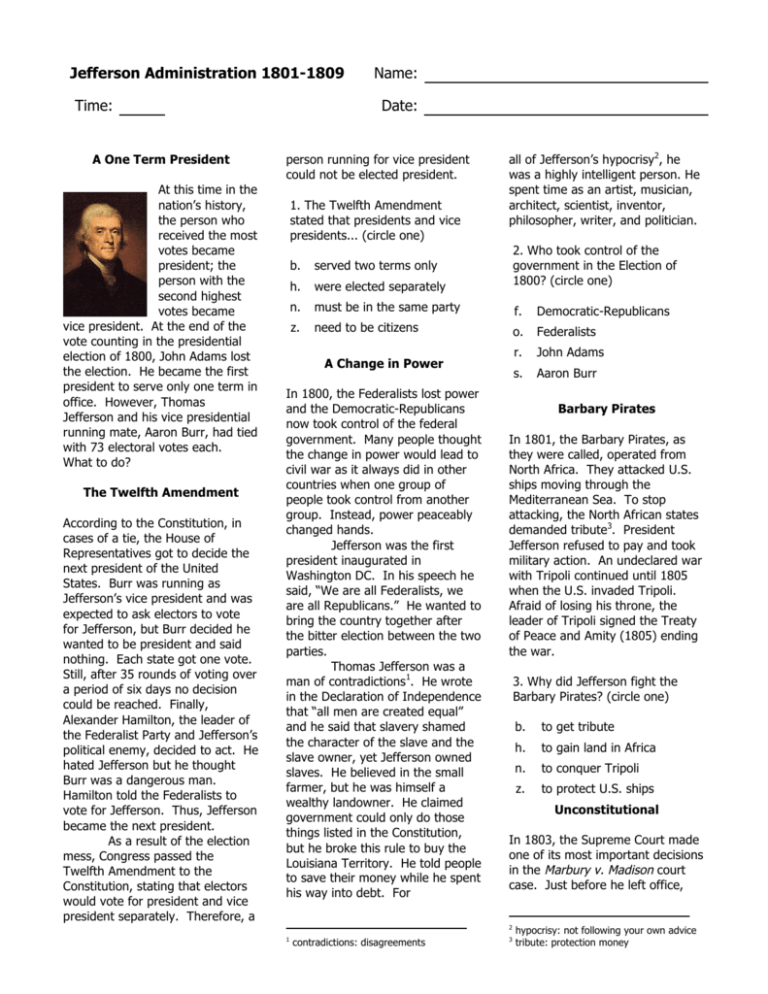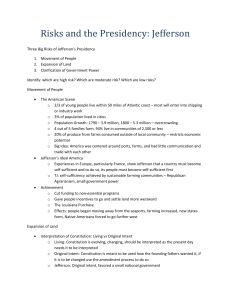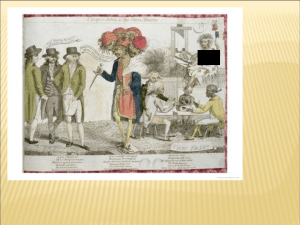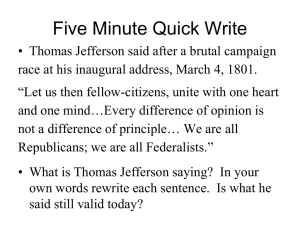Jefferson Administration
advertisement

Jefferson Administration 1801-1809 Time: A One Term President At this time in the nation’s history, the person who received the most votes became president; the person with the second highest votes became vice president. At the end of the vote counting in the presidential election of 1800, John Adams lost the election. He became the first president to serve only one term in office. However, Thomas Jefferson and his vice presidential running mate, Aaron Burr, had tied with 73 electoral votes each. What to do? The Twelfth Amendment According to the Constitution, in cases of a tie, the House of Representatives got to decide the next president of the United States. Burr was running as Jefferson’s vice president and was expected to ask electors to vote for Jefferson, but Burr decided he wanted to be president and said nothing. Each state got one vote. Still, after 35 rounds of voting over a period of six days no decision could be reached. Finally, Alexander Hamilton, the leader of the Federalist Party and Jefferson’s political enemy, decided to act. He hated Jefferson but he thought Burr was a dangerous man. Hamilton told the Federalists to vote for Jefferson. Thus, Jefferson became the next president. As a result of the election mess, Congress passed the Twelfth Amendment to the Constitution, stating that electors would vote for president and vice president separately. Therefore, a Name: Date: person running for vice president could not be elected president. 1. The Twelfth Amendment stated that presidents and vice presidents... (circle one) all of Jefferson’s hypocrisy2, he was a highly intelligent person. He spent time as an artist, musician, architect, scientist, inventor, philosopher, writer, and politician. b. served two terms only h. were elected separately 2. Who took control of the government in the Election of 1800? (circle one) n. must be in the same party f. Democratic-Republicans z. need to be citizens o. Federalists r. John Adams s. Aaron Burr A Change in Power In 1800, the Federalists lost power and the Democratic-Republicans now took control of the federal government. Many people thought the change in power would lead to civil war as it always did in other countries when one group of people took control from another group. Instead, power peaceably changed hands. Jefferson was the first president inaugurated in Washington DC. In his speech he said, “We are all Federalists, we are all Republicans.” He wanted to bring the country together after the bitter election between the two parties. Thomas Jefferson was a man of contradictions1. He wrote in the Declaration of Independence that “all men are created equal” and he said that slavery shamed the character of the slave and the slave owner, yet Jefferson owned slaves. He believed in the small farmer, but he was himself a wealthy landowner. He claimed government could only do those things listed in the Constitution, but he broke this rule to buy the Louisiana Territory. He told people to save their money while he spent his way into debt. For Barbary Pirates In 1801, the Barbary Pirates, as they were called, operated from North Africa. They attacked U.S. ships moving through the Mediterranean Sea. To stop attacking, the North African states demanded tribute3. President Jefferson refused to pay and took military action. An undeclared war with Tripoli continued until 1805 when the U.S. invaded Tripoli. Afraid of losing his throne, the leader of Tripoli signed the Treaty of Peace and Amity (1805) ending the war. 3. Why did Jefferson fight the Barbary Pirates? (circle one) contradictions: disagreements to get tribute h. to gain land in Africa n. to conquer Tripoli z. to protect U.S. ships Unconstitutional In 1803, the Supreme Court made one of its most important decisions in the Marbury v. Madison court case. Just before he left office, 2 1 b. 3 hypocrisy: not following your own advice tribute: protection money President Adams appointed William Marbury to a judgeship. However, incoming President Thomas Jefferson told Secretary of State James Madison not to deliver the appointment. Marbury went to the Supreme Court to sue Madison because the Judiciary Act of 1789 said the Supreme Court could force Madison to deliver the papers. The Supreme Court determined that part of the Judiciary Act was illegal or unconstitutional. The Judiciary Act gave more power to the Supreme Court than the Constitution allowed. In doing this, the Supreme Court gave itself the power of judicial review allowing the Court to declare an act of Congress unconstitutional. 4. In Marbury v. Madison, the Supreme Court... (circle two) f. o. r. s. had the right to declare a law unconstitutional could now serve for life gained the power of judicial review was allowed the ability to appoint judges Louisiana Purchase By 1799, the French Revolution had fallen apart allowing the popular general Napoleon Bonaparte to take power in France. In 1800, Bonaparte gained control of the Louisiana Territory from Spain. Once again, France owned territory in North America. Unfortunately, after a successful rebellion on the French controlled island of Hispaniola (Haiti), Bonaparte was forced to give up his desire for an American empire. To add to his troubles, he needed money to help finance a war against Great Britain. President Jefferson needed to gain control of New Orleans so Americans could use the Mississippi River as a highway to transport goods. He also perceived Bonaparte as a threat and was prepared to go to war to keep France out of Louisiana. Jefferson opened negotiations with France for buying New Orleans for $10 million, but was astounded when France offered all of Louisiana for $15 million. On April 30, 1803, both countries signed the Louisiana Purchase Treaty. The addition of Louisiana doubled the size of the United States and opened up the Mississippi to U.S. shipping. To explore the vast new territory, President Jefferson sent the Corps of Discovery, led by explorers Meriwether Lewis and William Clark, to travel to the Pacific Ocean and investigate the people and land along the way. Lewis and Clark left St. Louis in the spring of 1804 and returned in September 1806. Jefferson hoped the Corps would find a river route across the West to the Pacific, but none existed. Lewis and Clark did, however, make several maps that would aid later American explorers. In addition, the Corps made peaceful contact with and learned about many Native American nations. They also collected valuable information about western plants and animal life. Foreign Affairs In 1803, Britain and France went to war. America remained neutral4. However, by 1805, Britain had a shortage of sailors. The British navy began to capture American ships and impress or force American sailors into the British navy. In 1807, the British attacked an American ship, Chesapeake, off the coast of Virginia killing 3 and wounding 18. President Jefferson wanted to punish Britain but stopped short of declaring war. In December 1807, Congress passed the Embargo Act that stopped all trade with foreign powers. Jefferson believed France and Britain both needed American trade. Instead, without the ability to trade goods with foreign countries, the American economy crashed. Merchants could not sell their products and went bankrupt; workers lost their jobs. In March 1809, only days before he left office, Jefferson had the act repealed. Following Washington’s example of serving only two terms as president, Jefferson declined to run for a third term. 5. Why was Louisiana important to America? (circle one) 7. Britain violated American rights by... (circle two) b. it prevented a war with France b. attacking American ships h. the Mississippi River was used to transport goods it opened trade with Spain h. blockading coastal ports n. impressing American sailors taking American land n. z. z. Louisiana was a part of Oregon Territory 8. Jefferson responded to British aggression by... (circle one) 6. The Louisiana Purchase resulted in... (circle two) f. passing the Embargo Act the Lewis and Clark expedition o. declaring war on Britain r. making a French alliance o. war with France and Spain s. impressing British sailors r. doubling the size of the United States a civil war f. s. 4 neutral: not taking sides








